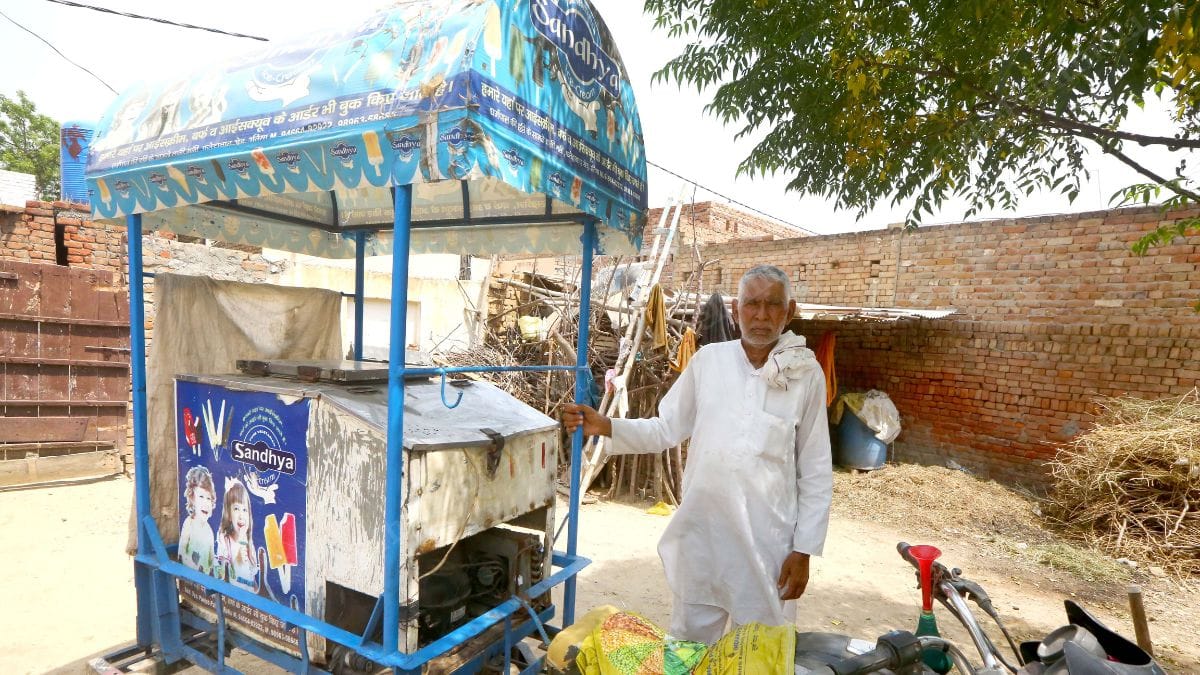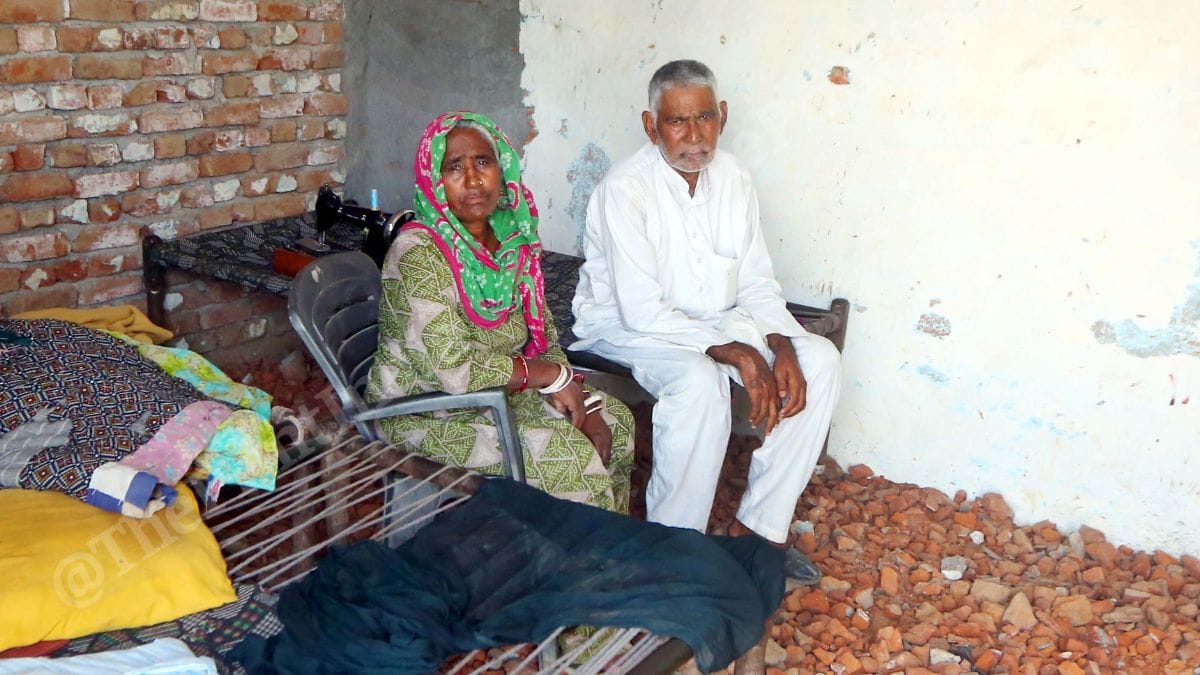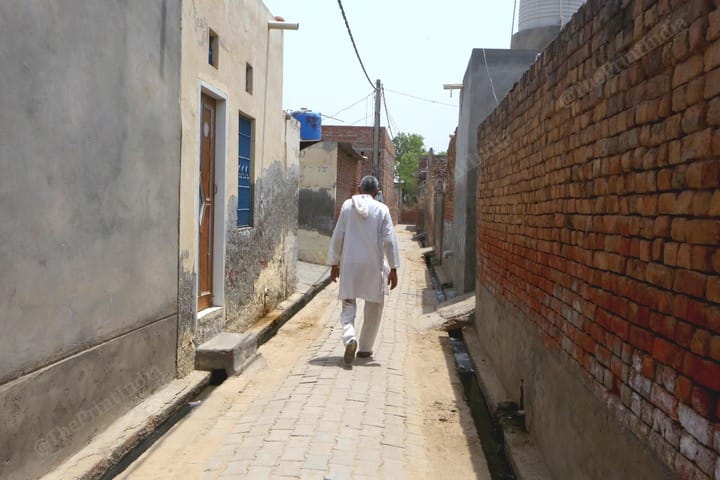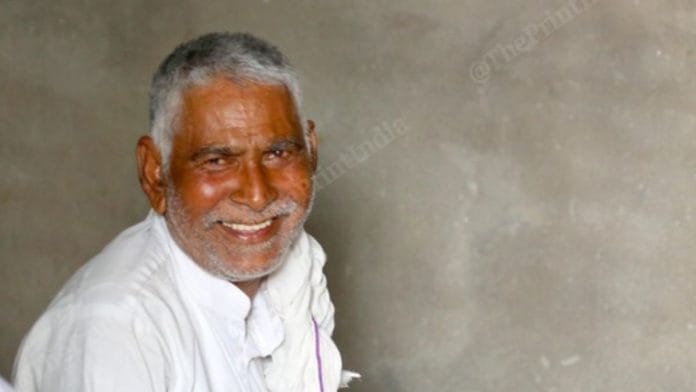Fatehabad: In a small, crowded room in Fatehabad’s Ratangarh, a group of men sit on charpoys, engrossed in discussing whether media attention may complicate Diwaya Ram’s situation. Their conversation is abruptly interrupted by a power outage. Frustrated groans fill the air as children scramble to find hand fans.
Diwaya Ram crossed over to India from Pakistan in 2000 after facing harassment and traumas as a minority Hindu. Now settled in Haryana, he, along with his family, applied for Indian citizenship on 28 March, 2024, last year under the Citizenship Amendment Act 2019. However, so far, he is not a citizen.
“Nothing will happen. Lord Ram is with me,” Diwaya Ram reassures the men. Though not all are convinced, after a couple of minutes, they concede that it is his story to tell.
Diwaya Ram then exits the room, along with his son Teka Ram, who pulls a kulfi cart towards their home, nearly 70 metres away.
Diwaya Ram has had a tiring day, and the scorching midday sun is harsh on his ageing body. He started his day at 8 am and stationed himself near the bus stand before moving close to the nearby school around noon. Then, he headed home for lunch before stepping out with his cart again at around 3 pm.
Once a member of Pakistan’s national assembly (MP) during Benazir Bhutto’s term, Diwaya Ram crossed the Attari-Wagah border to reach India. Since then, he has lived in Haryana—first, Rohtak and now, Fatehabad—doing odd jobs for over two decades to make ends meet. Now, he sells kulfis, earning around Rs 200 to 250 a day.
Diwaya Ram seems content even though he does not own the kulfi cart, and a chunk of his income goes to the owner. Earlier, he sold peanuts and even repaired tyres, he said. “Mine is a long story,” he added, wiping sweat from his forehead. “I have two dates of birth. So, I am unsure what my age is now, but probably between 70 and 80.”
In 2000, Diwaya Ram and 35 others, including 14 of his family members, crossed over to India on tourist visas. However, Diwaya Ram’s move was unique—he left Pakistan even though he was an MP. Of the 35 of the group, six are now Indian citizens, whereas Diwaya Ram, along with 10 of his family, is still waiting. He is now a father to eight sons and four daughters. One of them was born in Haryana after the move.

In 1988, Diwaya Ram claims he reached Pakistan’s national assembly by winning elections unopposed from the minority-reserved seats, from Layyah and Bhakkar during the first Benazir Bhutto government in Pakistan. ThePrint couldn’t independently verify this.
Diwaya Ram’s life in Pakistan, though, was largely marked by misfortunes.
“I attended school for just three days before dropping out due to bullying by other students because I belonged to a minority community. They called me kafir, so I stopped going. Our ancestral land, 25 acres in Layyah, Punjab, was also forcibly taken from us,” he recounted.
After the 22 April Pahalgam terror attack, India revoked visas to Pakistan nationals and issued them ‘Leave India’ notices. However, Diwaya Ram said, he did not get any such notice, and no one bothered him.
“We did not get any notice. Police officers came and investigated me and my family. They spoke to the sarpanch and other villagers, checked our documents, and left after they had verified information about us. Villagers told them we had been living here for years, and my children got married off, as well, here,” Diwaya Ram said. “We faced no trouble as such. Everyone knows that we fled Pakistan due to atrocities against Hindus.”
He added: “I have all the documents from when I applied for citizenship under the Citizenship Act 1955 in 2014, then in 2016, and again in 2019. But I had lost some of my documents [made in Pakistan], so things had got stuck all those times.”
Also Read: Electronic screening, automatic FIR: How Modi govt’s new e-Zero FIRs to solve cyber crime will work
‘I believed in Benazir’
“A young Benazir had come to our region to campaign. I went to see the rally. In her speech, she said the Pakistan People’s Party would give some seats to those from the minority community. I was thrilled to hear that. Even with my bare minimum knowledge and education, I knew it could help us. I believed in Benazir,” Diwaya Ram said.

When Diwaya Ram returned to his home in Pakistan’s Layyah that day, he asked 10-15 community members to gather. They swiftly decided that Diwaya Ram would be a PPP candidate.
Recounting the issue of his voter ID in Pakistan, Diwaya Ram said he clarified before officials that his name was Desh Raj.
“But they deliberately changed it to Allah Diwaya and left,” he said. “I ran from pillar to post, but no one listened. Eventually, an official told me they could list my religion as Hindu, but my [candidate] name would remain Allah Diwaya.”
According to his citizenship amendment documents—reviewed by ThePrint—his name appears as Allah Diwaya Ram.
“In those days, there were no [electoral] machines. People voted in ‘dabbas’. I won uncontested,” he explained.
However, fate had other plans for him. Far graver challenges dashed any hopes Diwaya Ram may have had for correcting the name error.
After winning the elections, things turned worse for him and his family.
In 1989, his brother-in-law’s daughter, then 16, was abducted. “Such incidents were common. They would kidnap our daughters and forcibly convert them,” Diwaya Ram said.
The family never found the 16-year-old. The traumatic event became the turning point for Ram to begin planning his escape from Pakistan. His sister and some other relatives had left Pakistan for India earlier in 1965.
“I did not go to the [Pakistani] assembly even once. I never took the car I received. How could I? Our time went looking for our daughter [brother-in-law’s daughter], protecting the family, and making ends meet,” he said.
Also Read: Days after his FB post on Op Sindoor & women officers, Ashoka prof Ali Khan Mahmudabad arrested
When he fled Pakistan
In the summer of 2000, Ram asked his wife, Rajjo Bai, to pack a few clothes and get the children ready. They asked some relatives to look after their house as they prepared to leave for India.
“We had a tourist visa for five months. Then, we kept extending it by applying for a long-term visa. Once we entered, we knew no one wanted to leave, even though we did not own agricultural land in India. I told my family we would figure it out, like others, and started living in Rohtak, where my sister lived,” Ram said.
However, things again turned worrisome for Ram and his family in 2006. Some people complained that the family was living in India illegally after the expiry of their visas, and the authorities wanted to deport the family.

“I started running pillar to post to get visas again. Some district officials, kind to us, stopped our deportation somehow. Since then, no one has bothered us again,” he said.
In 2018, the family moved to their current home in Ratangarh. “My uncle, who came here during the 1947 Partition, had bought a piece of land. He transferred the registry to my name,” Diwaya Ram said.
There was more good news soon. His family was thrilled when CAA passed, he says. “We will get citizenship; we know these things take time,” he adds.
It is easy to locate his house in Ratangarh, home to nearly 2,100 electors. If no one recognises his name, one can refer to him as the “man who came from Pakistan”, and everyone understands.
Over the years, Diwaya Ram has become an important community member.
(Edited by Madhurita Goswami)







A story of tragedy and hope. Hope someone makes a film about him and he gets some money, and Indian citizenship.